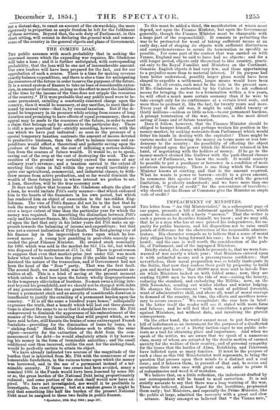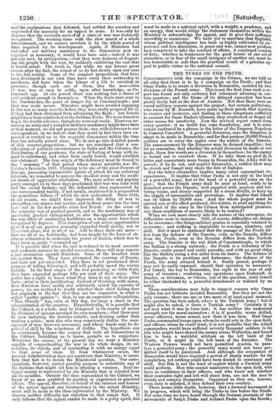IMPEACHMENT OF MINISTERS.
THE letter from "An Old Ministerialist," in a subsequent page of our paper, presents a bill of indictment against Ministers, which cannot be dismissed with a hasty "answer." That the writer is such a person as he describes himself, we know; and we may add, that he is a man who has at once proved his independence, his ca- pacity for public business, and his disposition not to raise small points of difference for the obstruction of the responsible adminis- trators. His character compels us to believe that a sense of moral duty obliges him to bring forward his case ; he has a right to be heard ; and the case is well worth the consideration of the pub- lic, of Parliament, and of the impugned Ministers.
Briefly stated, the charge which be presents is, that we were fore- warned of war nearly a whole year; that Ministers entered upon it with unlimited means and a presumptuous confidence ; that nevertheless, their naval preparation was so totally inadequate in the Baltic, that now they confess their guilt by proposing to build gun and mortar boats ; that 30,000 men were sent to invade Rus- sia while Ministers looked on with folded arms ; now, they are sending 12,000 men to turn the tide of war—raising the bounty, reducing the standard, and embodying the Militia ; now, on the 20th November, sending out winter clothes and winter lodging. He charges the Government "with want of political foresight, want of administrative skill, and above all, want of moral courage to demand of the country, in time, the efforts and sacrifices neces- sary to secure success." We recapitulate the case here in brief: in the letter itself the reader will see it stated with more force and fulness ; and he will feel that it constitutes a grave charge against Ministers, not without data, and involving the gravest consequences. On the other hand, the writer cannot mean to put forward his bill of indictment as an instrument for the purposes of a disaffected Manchester party, or of a Derby faction eager to use public inte- rests as a tool for obtaining place and importance. And when we speak of the writer, we are aware that we speak of a numerous class, many of whom are actuated by the double motive of earnest anxiety for the welfare of their country, and of personal sympathy for the losses that the battles of Alma, Balaklava, and Inkerman have inflicted upon so many families. It must be the purpose of such a class as this Old Ministerialist well represents, to bring the question that presses upon their minds to a distinct and a real issue; and it behoves them, in pursuit of that end, to revise and scrutinize their own ease with great care, in order to prune it of redundancies and weed it of mistakes.
We believe that, on a little reflection, the indictment drafted by
our correspondent will be found to need correction. It is not strictly accurate to say that there was a long warning of the war. Those who believed, almost hoped for the hostilities, prophesied them early ; but Ministers, and especially the Prime Minister, like th public at large, admitted the necessity with a great and slow uctance. Many amongst us believed that "the Vienna note," and the explanations that folloVed, had settled the question and superseded the necessity for an appeal to arms. It was only by degrees that the veritable arrival of a state of war was distinctly recognized. The warning came svAth the slow march of a whole twelvemonth, and we cannot antedate it by the whole period of time required for its development. Again, if Ministers had extended- our military machinery to the dimensions now re- cognized as necessary, it would have been said,—indeed it was already said, by anticipation,—that they were desirous of disgust- ing the people with the war, by suddenly exhibiting the cost that it would entail. The truth is, that while we can foresee great events after the fact, the wisest of us do but slowly open our eyes to the full reality. Some of the simplest propositions that have been developed in our own time have owed their authorship to accidents, and have taken the labour of a life to establish in practice ; though each one of them, like the necessities of war, was as easy to settle, upon after knowledge, as Co- lumbus's egg. At one period there was nothing but a choice of evils evident enough in themselves. When the fleets were sent to the Dardanelles, the point of danger lay at Constantinople; and that was made secure. Ministers might have avoided engaging in the war so many months before they were really prepared for it, if they had then abstained from advancing the fleets ; but Russia might have been established at the Sublime Porte. We were forced to begin the hostile advance, though we were not ready. However ne- cessary an army and a complete military machinery might have been at that moment, we did not possess them ; nor, with deference to our correspondent, do we believe that they could in fact have been ex- panded or created up to the requisite dimensions within the time that has actually passed since. We do not go into detailed proofs of this counter-proposition ; but we are convinced that a con- sideration of political circumstances in India and the Colonies, the distribution of our garrisons, the state of feeling at home with re- gard to enlistment, and other facts easily tested, would establish our statement. The true origin of the deficiency must be traced to the " economy " of that period whose annus mirabilis was Mr. Cobden's favourite 1837. Claiming to be one of the great Powers of Europe, possessing innumerable points of attack for our collateral interests, we consented to possess the smallest army and the small- est means of aggressive retaliation. The most active and popular party amongst us in those days proclaimed that war was done with and the sword broken ; and the influential class represented by our correspondent tacitly, if not openly, acquiesced in a proposition the monstrous fallacy of which we now understand. Since 1844, at all events, we might have improved the delay of war to strengthen our armies and navies ; and in those years was the time lost—not in the few months since last March. As the sense of the necessity was of gradual growth, and as the machinery was of inevitably gradual enlargement, so also the opportunities which the war offers of conducting hostilities on a large scale have been recognized by degrees. This conception of our active opportunities as well as of our passive necessity expanded itself slowly, not to Ministers alone, but to all of us. Add to these facts one more— that we all of us, habitually, had been taught by the force of ob- stinate reiteration to underrate the power of Russia, which was to have been so easily "crumpled up.', It is possible that when the case is reduced to its most accurate and moderate amount by careful correction, there still may remain a just accusation against Ministers. Some of the broadest facts are against them. They have attempted the coercion of Russia, and have not yet succeeded. They have in act proclaimed their purpose of taking Sebastopol, and will probably spend the winter outside. In the first stages of the war producing so little fruit, they have expended perhaps fifty per cent of their army. The public has a right to know what they have to say on these great facts—what is their justification. Instead of thinking, with many, that Ministers have rashly and arbitrarily seized the exercise of power, we are inclined to doubt whether their chief failing does not originate in the fact that they are too responsive to what is called "public opinion "; that, to use an expressive colloquialism, "Mrs. Grundy" has, even at this day, too large a share in the administration of the country. Hypothetically, it is possible that the Cabinet, as a whole, may be hampered in its course of action by divisions of opinion amongst its own members,—that there may be men imitating the factions outside, and desiring rather than waiting a crisis ; men also who may consciously dislike the man- agement of war, however necessary, and whose hands may be de- prived of skill by the reluctance of dislike. The hypothesis can be entertained, because the secrecy that veils all transactions in the Cabinet, forbidding us to know, permits us to conjecture. Whatever the excuse, at the present 'lay we want a Ministry capable of comprehending the war in its whole design, its ne- cessities' its objects, and of conducting it with an energy equal to that scope of view. If, from whatsoever cause, the present Administration does not constitute that Ministry, to ascer- tain that fact is to decide the Ministerial question. Our corre- spondent, however, cannot possibly purpose to substitute any of the factions that might aid him in creating a vacancy. Real na- tional society is represented by the Ministry that is selected from all its notables. Outside the class represented in the Cabinet, we know of no men qualified by position or experience in practical affairs. The appeal, therefore, on behalf of the interest and honour of the nation against any incompetency in the actual Ministry, must still be made to the class represented by the Ministry. We discern neither difficulty nor objection in that simple fact. It only follows that the appeal cannot be made in a party spirit, but
must be made in a national Spirit,' with a *eight, a pradeime, and an energy, that would oblige the Statesmen themselves within the Ministry to acknowledge the appeal, and to give their suffrages according to conscience. We have yet to ascertain that England, whose political intelligence has been so highly cultivated by ex- perience and free discussion, in peace and war, cannot now produce men competent to take the conduct of affairs. A continued evasion of duty, whether in tenderness for the good intent of one set of statesmen, or in fear of the small intrigues of another set, must be less honourable or safe than the practical result of a genuine ap- peal to publio virtue in the national council.



































 Previous page
Previous page